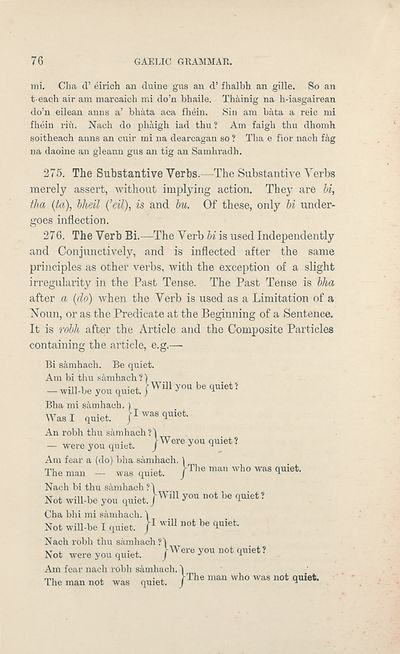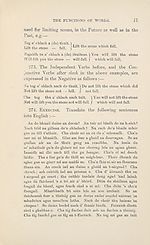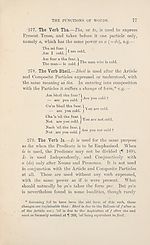Download files
Complete book:
Individual page:
Thumbnail gallery: Grid view | List view

76
GAELIC GRAMMAR.
mi. Cha d’ eirich an duine gus an d’ fhalbh an gille. So an
t each air am marcaich mi do’n bhaile. Thainig na h-iasgairean
do’n eilean anns a’ bhata aca fhein. Sin am bata a reic mi
fhein riu. Nach do phaigh iad thu ? Am faigh thu dhomh
soitheach anns an cuir mi na dearcagan so ? Tha e fior nach fag
na daoine an gleann gus an tig an Samhradh.
275. The Substantive Verbs.—The Substantive Verbs
merely assert, without implying action. They are U,
tha (ta), bheil (’eil), is and bu. Of these, only bi under¬
goes inflection.
276. The Verb Bi.—The Verb bi is used Independently
and Conjunctively, and is inflected after the same
principles as other verbs, with the exception of a slight
irregularity in the Past Tense. The Past Tense is bha
after a (do) when the Verb is used as a Limitation of a
Noun, or as the Predicate at the Beginning of a Sentence.
It is robh after the Article and the Composite Particles
containing the article, e.g.—
Bi samhach. Be quiet.
Am bi thu samhach ?)
- will-be you quiet. } Wil1 you be 1uiet*
Bha mi samhach. )
Was I quiet. j1 was quiet.
An robh thu samhach ?'|
j-Were you quiet?
— were you quiet.
Am fear a (do) bha samhach.
The man — was qi
Nach bi thu samhach
Not will-be you quiet.
Cha bhi mi samhach. I
Not will-be I quiet, j1 wiU not be <luiet-
Nach robh thu samhach ? j
Not were you quiet. }Were y°u not ^ ?
Am fear nach robh samhach.
quiet |^The man who was quiet.
. j-Will you not be quiet?
I The n
n who was not quiet.
GAELIC GRAMMAR.
mi. Cha d’ eirich an duine gus an d’ fhalbh an gille. So an
t each air am marcaich mi do’n bhaile. Thainig na h-iasgairean
do’n eilean anns a’ bhata aca fhein. Sin am bata a reic mi
fhein riu. Nach do phaigh iad thu ? Am faigh thu dhomh
soitheach anns an cuir mi na dearcagan so ? Tha e fior nach fag
na daoine an gleann gus an tig an Samhradh.
275. The Substantive Verbs.—The Substantive Verbs
merely assert, without implying action. They are U,
tha (ta), bheil (’eil), is and bu. Of these, only bi under¬
goes inflection.
276. The Verb Bi.—The Verb bi is used Independently
and Conjunctively, and is inflected after the same
principles as other verbs, with the exception of a slight
irregularity in the Past Tense. The Past Tense is bha
after a (do) when the Verb is used as a Limitation of a
Noun, or as the Predicate at the Beginning of a Sentence.
It is robh after the Article and the Composite Particles
containing the article, e.g.—
Bi samhach. Be quiet.
Am bi thu samhach ?)
- will-be you quiet. } Wil1 you be 1uiet*
Bha mi samhach. )
Was I quiet. j1 was quiet.
An robh thu samhach ?'|
j-Were you quiet?
— were you quiet.
Am fear a (do) bha samhach.
The man — was qi
Nach bi thu samhach
Not will-be you quiet.
Cha bhi mi samhach. I
Not will-be I quiet, j1 wiU not be <luiet-
Nach robh thu samhach ? j
Not were you quiet. }Were y°u not ^ ?
Am fear nach robh samhach.
quiet |^The man who was quiet.
. j-Will you not be quiet?
I The n
n who was not quiet.
Set display mode to:
![]() Universal Viewer |
Universal Viewer | ![]() Mirador |
Large image | Transcription
Mirador |
Large image | Transcription
| An Comunn Gàidhealach > An Comunn Gàidhealach Publications > Scottish Gaelic as a specific subject > (80) |
|---|
| Permanent URL | https://digital.nls.uk/125955977 |
|---|
| Description | This contains items published by An Comunn, which are not specifically Mòd-related. It includes journals, annual reports and corporate documents, policy statements, educational resources and published plays and literature. It is arranged alphabetically by title. |
|---|
| Description | A collection of over 400 items published by An Comunn Gàidhealach, the organisation which promotes Gaelic language and culture and organises the Royal National Mòd. Dating from 1891 up to the present day, the collection includes journals and newspapers, annual reports, educational materials, national Mòd programmes, published Mòd literature and music. |
|---|---|
| Additional NLS resources: |
|

